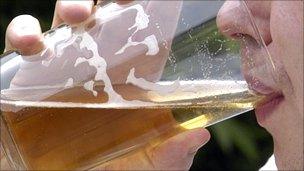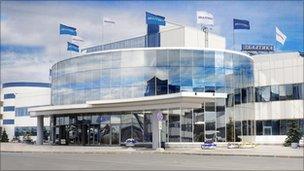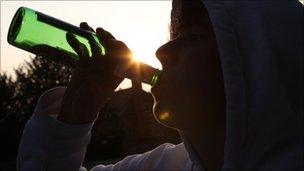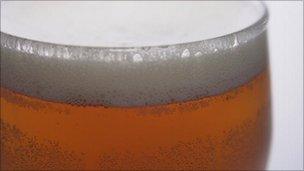Russia beer sales suffering tax hike
- Published

During the past decade, beer sales in Russia have risen by more than 40%
In a bar in the heart of St Petersburg, widescreen TVs show a match between local football team Zenit and Bayern Munich, two giants of European football - but this is not the only thing these two cities have in common.
While Munich is Europe's beer capital, St Petersburg is the beer capital of Russia.
It may seem like sacrilege in a country famed for its vodka, but this bar is devoted to the amber nectar - the ideal place to find out why a growing number of young Russians are swapping vodka for beer.
"Vodka is a heavy drink that not everyone likes and the quality of vodka has got worse," a young Russian women tells me over her pint.
"And it is easier for young people to buy beer, they don't sell vodka to under-18s in shops," her friend says.
Another punter tells me more bluntly: "Vodka turns people into animals and beer doesn't."
Consumption growth
During the past decade, beer sales in Russia have risen by more than 40%, while vodka sales have fallen by nearly 30%.
It is now the fourth largest beer market in the world, after China, the US and Brazil.
Beer is marketed and consumed as a healthier alternative to vodka. It is common to see people swigging from cans in the street and in parks, as if they are drinking Coca-Cola.
And incredibly beer is not even classified as an alcoholic drink in Russia.
But this popularity is causing concern, particularly for the government.

Baltika has about 40% of the Russian beer market
Russians' alcohol consumption is already twice the critical norm set by the World Health Organisation, and male life expectancy is falling.
"Alcohol consumption has been growing really fast," Viktor Zvagelsky, State Duma Deputy tells the BBC's Russia Business Report.
He says the main problem is there are no proper laws to deal with it or programmes to promote healthy living.
"This is one of the main tasks for the government and it has been highlighted by both the president and prime minister," says Mr Zvagelsky.
Future increases
So after years of bumper profits, the Russian beer industry has been hit where it hurts, with higher taxes.
In 2010 the tax on beer went up by a staggering 200%.
Zvagelsky believes the tax hike is long overdue.
"Beer has been taxed differently in the past which helped beer companies sell huge volumes and spend a lot of money on advertising and promotion, without having to worry about anything else," he says.
But, Mr Zvagelsky says, beer should be subject to the same restrictions as other alcohol.
"Even now beer is cheap, 200% tax is not enough. We have more plans to increase the tax on vodka by 120% and beer by 80%," he says.

Russian's alcohol consumption is twice the critical norm set by the World Health Organisation
All this is bad news for the world's biggest brewers. More than 80% of the Russian beer market is controlled by just five players: Baltika Breweries, SUN InBev, Heineken, Efes and SABMiller Rus.
With sales in mature markets such as Western Europe flat, they have invested billions of dollars in Russia.
Three football pitches
As Carlsberg might say, it is probably the best market in the world. The Danish brewing giant owns Russia's biggest beer company Baltika, which has about 40% of the market.
Eastern Europe, which includes Russia, accounts for about a third of Carlsberg's revenue but almost half its profits.
International brewers have helped develop the market both in terms of investment in production, and also promotion and marketing.
One of the best examples of this is Baltika's flagship brewery in St Petersburg, now the biggest brewery in Europe.
As well as producing beer for Russia, it exports the famous Japanese beer Asahi all over Europe.
The air here is thick with the smell of fermenting malt and hops.
We walk through a narrow corridor lined with hundreds of vats, and into the brewhouse. Open a vat and you will see a huge, swirling head of beer about 3m (10ft) wide.
You would not want to get lost here. The building is huge.
We walk down endless corridors and across numerous bridges.
When we finally reach the warehouse, it is the size of three football pitches.
'Emotional criticism'
We met Baltika's head of corporate affairs Alexey Kedrin in the microbrewery, where they experiment with new flavours.

Beer sales fell by 15% in Russia during the past two years
After tasting the latest brew, a one-day-old Imperial Stout, he tells me how the government tax hike is hitting business.
"We had to cut down on all our extra expenses, stop some programmes, like administration and the amount of water we use in production," says Mr Kedrin.
Also, he says, they could not avoid raising the price of their products by an average of 25% in 2010.
He says he does not know why the tax on beer was raised so much, but suggests that "it may be that the influence of the spirits and vodka lobby on the government and state Duma turned out to be significant".
This is contested by the spirits industry.
"The criticism from beer companies is emotional", Maxim Chernigovsky, from the Alcohol Market Professionals Club, which represents spirit makers around Russia, told the BBC.
He says beer companies are lobbying to defend their own interests, adding they enjoy more preferences than the producers of strong alcohol drinks.
"The excise tax on vodka is 10 times higher than beer, so the difference is obvious," says Mr Chernigovsky.
Room for growth
There is definitely a tension between the two titans of Russia's drinks industry.
The beer industry may be backed by billions of dollars of foreign funds, but they feel powerless against Russia's vodka lobby, which they say has more political influence.
Russian politicians have been reluctant to take on the vodka industry in the past.
Soviet leader Mikhail Gorbachev was the last leader to seriously clamp down on vodka and once he did so, government revenues and his popularity both plummeted.
But with the government set to significantly raise taxes on both beer and vodka, it looks as though both sides could lose.
This will be bad news for brewers such as Baltika, which are still recovering from last year's tax hike.
That, coupled with the economic crisis, has seen beer sales fall by 15% during the past two years.
But the brewers point out there is room for more growth in this market, as Russians still drink less beer per person than in Western Europe.
Also, beer sales have started to level out - but it is too early for Russia's brewers to toast a recovery.